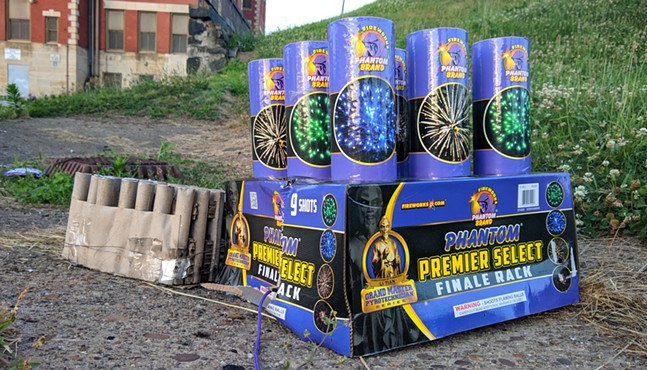City announces 'taskforce' of police officers and fire investigators to patrol neighborhoods to handle fireworks complaints
People in Pittsburgh, and the around the country, have grown accustomed to hearing frequent fireworks. Or at least hearing friends and colleagues complain about hearing fireworks.
The spike in pedestrian pyrotechnics has been attributed to everything from regular summer boredom to conspiracy theories about sonic warfare from the government. Regardless of the reason, from June 1 to June 21, Pittsburgh Police received a 389% increase in complaints about fireworks from the same time period last year.
Now, public safety officials have announced they are responding to the increase in fireworks and complaints by creating a "fireworks taskforce" of police officers and fire investigators. The taskforce plans to "patrol city neighborhoods and respond to 911 calls for illegal fireworks."
A press release states that it is illegal to set off fireworks, even ones that are legal, within 150 feet of any structure. Fireworks are also prohibited in public parks, and "fireworks can almost never be set off legally inside city limits," according to the press release, which also states that illegal firework use is subject to a $100 fine.
While an increase in illegal fireworks is a safety hazard, both for those setting off fireworks, and for those hearing them who might have strong reactions, like veterans with PTSD or scared pets, some take issue with increased police presence as a response to fireworks.
After a month of ongoing protests in Pittsburgh and around the country in response to police violence and brutality, some see the city sending police officers to patrol neighborhoods for non-violent offenses as endangering trust with residents, when the public has never been more vocal about their dissatisfaction with the police.
Chris Deluzio, policy director at Pitt Cyber, University of Pittsburgh's department focusing on law, policy, and technology, says increasing police presence is not always the answer for addressing community issues.
"Roving nighttime patrols of police in neighborhoods to target people with fireworks (likely kids) will inevitably lead to more interactions with armed police in the dark—a potentially dangerous situation," says Deluzio. "This is precisely the kind of issue that demands a different public safety approach to minimize interactions between armed police and residents."
Deluzio believes that firefighters should be deployed if there is concern for fireworks causing fires, but that the city should work with communities in a "less threatening and more productive way" to reduce danger around fireworks.
"Rethinking policing and public safety has to include ways to address issues—especially non-violent ones like fireworks—without relying on armed police and the threat of arrest," he says.
The spike in pedestrian pyrotechnics has been attributed to everything from regular summer boredom to conspiracy theories about sonic warfare from the government. Regardless of the reason, from June 1 to June 21, Pittsburgh Police received a 389% increase in complaints about fireworks from the same time period last year.
Now, public safety officials have announced they are responding to the increase in fireworks and complaints by creating a "fireworks taskforce" of police officers and fire investigators. The taskforce plans to "patrol city neighborhoods and respond to 911 calls for illegal fireworks."
A press release states that it is illegal to set off fireworks, even ones that are legal, within 150 feet of any structure. Fireworks are also prohibited in public parks, and "fireworks can almost never be set off legally inside city limits," according to the press release, which also states that illegal firework use is subject to a $100 fine.
While an increase in illegal fireworks is a safety hazard, both for those setting off fireworks, and for those hearing them who might have strong reactions, like veterans with PTSD or scared pets, some take issue with increased police presence as a response to fireworks.
After a month of ongoing protests in Pittsburgh and around the country in response to police violence and brutality, some see the city sending police officers to patrol neighborhoods for non-violent offenses as endangering trust with residents, when the public has never been more vocal about their dissatisfaction with the police.
Chris Deluzio, policy director at Pitt Cyber, University of Pittsburgh's department focusing on law, policy, and technology, says increasing police presence is not always the answer for addressing community issues.
"Roving nighttime patrols of police in neighborhoods to target people with fireworks (likely kids) will inevitably lead to more interactions with armed police in the dark—a potentially dangerous situation," says Deluzio. "This is precisely the kind of issue that demands a different public safety approach to minimize interactions between armed police and residents."
Deluzio believes that firefighters should be deployed if there is concern for fireworks causing fires, but that the city should work with communities in a "less threatening and more productive way" to reduce danger around fireworks.
"Rethinking policing and public safety has to include ways to address issues—especially non-violent ones like fireworks—without relying on armed police and the threat of arrest," he says.



















